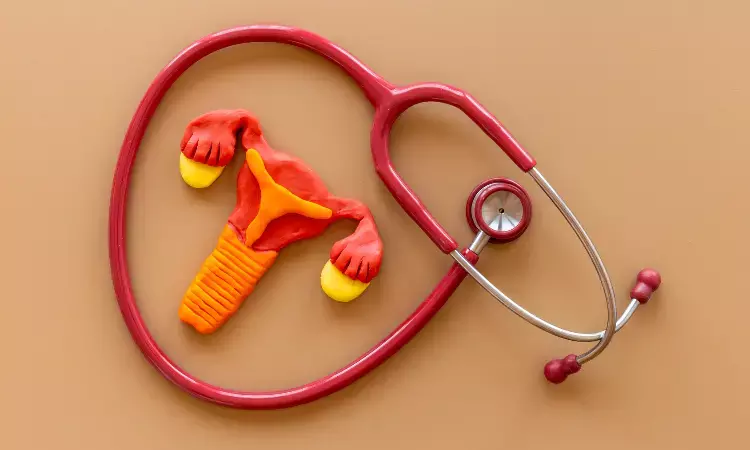- Home
- Medical news & Guidelines
- Anesthesiology
- Cardiology and CTVS
- Critical Care
- Dentistry
- Dermatology
- Diabetes and Endocrinology
- ENT
- Gastroenterology
- Medicine
- Nephrology
- Neurology
- Obstretics-Gynaecology
- Oncology
- Ophthalmology
- Orthopaedics
- Pediatrics-Neonatology
- Psychiatry
- Pulmonology
- Radiology
- Surgery
- Urology
- Laboratory Medicine
- Diet
- Nursing
- Paramedical
- Physiotherapy
- Health news
- Fact Check
- Bone Health Fact Check
- Brain Health Fact Check
- Cancer Related Fact Check
- Child Care Fact Check
- Dental and oral health fact check
- Diabetes and metabolic health fact check
- Diet and Nutrition Fact Check
- Eye and ENT Care Fact Check
- Fitness fact check
- Gut health fact check
- Heart health fact check
- Kidney health fact check
- Medical education fact check
- Men's health fact check
- Respiratory fact check
- Skin and hair care fact check
- Vaccine and Immunization fact check
- Women's health fact check
- AYUSH
- State News
- Andaman and Nicobar Islands
- Andhra Pradesh
- Arunachal Pradesh
- Assam
- Bihar
- Chandigarh
- Chattisgarh
- Dadra and Nagar Haveli
- Daman and Diu
- Delhi
- Goa
- Gujarat
- Haryana
- Himachal Pradesh
- Jammu & Kashmir
- Jharkhand
- Karnataka
- Kerala
- Ladakh
- Lakshadweep
- Madhya Pradesh
- Maharashtra
- Manipur
- Meghalaya
- Mizoram
- Nagaland
- Odisha
- Puducherry
- Punjab
- Rajasthan
- Sikkim
- Tamil Nadu
- Telangana
- Tripura
- Uttar Pradesh
- Uttrakhand
- West Bengal
- Medical Education
- Industry
Nasal therapeutic vaccine may treat cervical cancer: Study

Cervical cancer, which affects the reproductive tract, is one of the most common cancers in women worldwide. It is primarily caused by the human papillomavirus (HPV), a viral infection that spreads through sexual contact. While regular screening tests and preventive HPV vaccines can lower the risk of developing the disease, there are no approved therapeutic medicines to treat existing infections or HPV-associated cancers. As a result, current treatments remain limited to surgery, radiotherapy, or chemotherapy.
Now, researchers from Chiba University, Japan, have developed a therapeutic HPV vaccine that can be administered through the nose. This new intranasal vaccine could provide a non-invasive treatment option for individuals already infected with the virus. Unlike injectable vaccines, nasal vaccines trigger an immune response at the mucosal surface, which lines the upper airway and contributes to the protection of distant mucosal sites, including the reproductive tract, and acts as a protective barrier against pathogens and foreign particles.
The study, led by Associate Professor Rika Nakahashi-Ouchida and Ms. Hiromi Mori from Chiba University Hospital, Chiba University, was published in the journal Science Translational Medicine on November 12, 2025.
The team had previously found that nasal immunization produced strong immune responses in the reproductive tract against herpes simplex virus type 2 (HSV-2). Antigen-specific T cells remained in the vaginal mucosa, providing local protection where it was needed the most. Building on this idea, the researchers used cationic nano-sized hydrogel particles called cCHP nanogels to deliver HPV antigens directly to nasal mucosal tissues. These nanogels are made of positively charged cholesteryl groups that form small spherical structures. Their positive charge allows them to adhere to negatively charged nasal mucosal surfaces, where they gradually release the antigens.
“We have developed an intranasal therapeutic vaccine as a non-surgical alternative to conventional treatments that can compromise women’s quality of life. This novel nasal vaccine activates the mucosal homing pathways of lymphocytes, allowing it to trigger an immune response in the cervical mucosa, a site from the nasal administration,” says Associate Prof. Nakahashi-Ouchida.
The vaccine targets E7 oncoprotein, which is produced by HPV16, one of the most common high-risk strains associated with cervical cancer. This protein inactivates the key tumor suppressor pRb, which normally helps prevent cancer formation. To strengthen the immune response, the researchers added cyclic-di-AMP (c-di-AMP), an immune-boosting adjuvant that enhances T-cell-mediated immunity, encouraging the body’s T cells to attack infected or cancerous cells directly.
The resulting formulation, called cCHP-E7 + c-di-AMP, showed strong antitumor activity in both mice and macaques. In mouse models, the nasal vaccine significantly slowed tumor growth compared with control groups. The team then tested the vaccine in macaques using a nasal spray device that can also be used in humans. After four doses, the vaccinated macaques developed high levels of E7-specific helper and killer T cells that produced immune molecules associated with tumor control. The control animals did not show this immune response. Importantly, immune activity was also detected in the cervical tissue, suggesting that the nasal vaccine successfully triggered protection where it is most needed. Even 4 months after the final dose, E7-specific killer T cells remained active, indicating a lasting immune defense against HPV-related cancer.
According to the World Health Organization, cervical cancer caused an estimated 660,000 new cases and 350,000 deaths in 2022. If proven safe and effective in humans, this nasal vaccine could transform cervical cancer treatment by offering a non-invasive, fertility-preserving alternative to surgery. Moreover, the cCHP nanogel delivery system could serve as a platform for nasal vaccines targeting other pathogens as well as broader clinical applications.
“Immunotherapies such as intranasal therapeutic vaccines may help establish a new category of non-invasive treatment. These approaches could be extended to recurrence prevention and chronic disease management, offering patients safer and more accessible options,” says Associate Prof. Nakahashi-Ouchida.
Reference:
Rika Nakahashi-Ouchida et al. ,Cationic nanogel–based nasal therapeutic HPV vaccine prevents the development of cervical cancer.Sci. Transl. Med.17,eado8840(2025).DOI:10.1126/scitranslmed.ado8840
Dr Kamal Kant Kohli-MBBS, DTCD- a chest specialist with more than 30 years of practice and a flair for writing clinical articles, Dr Kamal Kant Kohli joined Medical Dialogues as a Chief Editor of Medical News. Besides writing articles, as an editor, he proofreads and verifies all the medical content published on Medical Dialogues including those coming from journals, studies,medical conferences,guidelines etc. Email: drkohli@medicaldialogues.in. Contact no. 011-43720751


